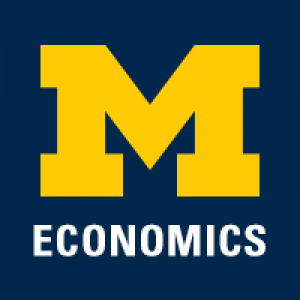Presented By: Health, History, Demography and Development (H2D2)
Health, History, Demography and Development (H2D2)
Population Growth, Decline, and Shocks in Local Labor Markets presented by Mike Zabek/A Structural Approach to Counterfactual Program Evaluation in the Presence of Endogenous Network Formation presented by Alan Griffith; University of Michigan

Population Growth, Decline, and Shocks in Local Labor Markets Abstract:
I examine demographic growth and decline across local labor markets to show how the process generates an interesting and economically meaningful form of state dependence. Local labor markets grow primarily through migration, which leads to large differences in the proportion of residents born locally and also the size of subsequent flows of migrants. These differences have implications for future growth, responses to economic shocks, and the welfare impacts of governmental policies. To illustrate this, I develop a Rosen (1979) and Roback (1982) style model of spatial equilibrium. I use the model to quantify welfare effects of governmental spending and procurement for local labor markets and show how these depend on migration responses. In the model, workers value living where they were born, which leads to variances in the share born locally based on previous growth or decline. A simple corollary is that migration responses are inversely proportional to the share of residents born locally. Since migration responses tend to equalize utility across areas, governmental spending in a declining area will increase population less and utility more than an equivalent policy in a growing area.
A Structural Approach to Counterfactual Program Evaluation in the Presence of Endogenous Network Formation Abstract:
The past two decades have seen an explosion of applied economics research on peer effects. However, attempts to leverage peer effects by creative group assignment have failed to account for endogenous peer group formation conditional on group assignment. To address this, I develop and estimate a model of network formation and non-linear peer effects in which actors make continuous linking decisions subject to a total effort constraint. In the empirical application, the model is estimated with detailed network and outcome data gathered as part of a randomized trial in rural Rajasthan, and the model is validated by comparison of simulated outcomes to realized out-of-sample outcomes. Finally, I simulate expected outcomes for a variety of counterfactual policies.
I examine demographic growth and decline across local labor markets to show how the process generates an interesting and economically meaningful form of state dependence. Local labor markets grow primarily through migration, which leads to large differences in the proportion of residents born locally and also the size of subsequent flows of migrants. These differences have implications for future growth, responses to economic shocks, and the welfare impacts of governmental policies. To illustrate this, I develop a Rosen (1979) and Roback (1982) style model of spatial equilibrium. I use the model to quantify welfare effects of governmental spending and procurement for local labor markets and show how these depend on migration responses. In the model, workers value living where they were born, which leads to variances in the share born locally based on previous growth or decline. A simple corollary is that migration responses are inversely proportional to the share of residents born locally. Since migration responses tend to equalize utility across areas, governmental spending in a declining area will increase population less and utility more than an equivalent policy in a growing area.
A Structural Approach to Counterfactual Program Evaluation in the Presence of Endogenous Network Formation Abstract:
The past two decades have seen an explosion of applied economics research on peer effects. However, attempts to leverage peer effects by creative group assignment have failed to account for endogenous peer group formation conditional on group assignment. To address this, I develop and estimate a model of network formation and non-linear peer effects in which actors make continuous linking decisions subject to a total effort constraint. In the empirical application, the model is estimated with detailed network and outcome data gathered as part of a randomized trial in rural Rajasthan, and the model is validated by comparison of simulated outcomes to realized out-of-sample outcomes. Finally, I simulate expected outcomes for a variety of counterfactual policies.
Explore Similar Events
-
Loading Similar Events...
